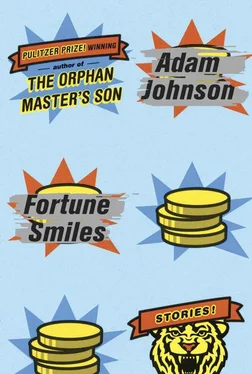Before long, I hear footsteps, a key in the lock. When the door opens, Berta regards me.
“I thought you forgot about me,” I say.
Even backlit by bright light, I can tell by her look that forgetting me is not possible.
“Doing this was wrong of me,” she says. “This is not who I am or what I believe in.”
“The truth is that I don’t remember you,” I tell her. “I was responsible for a great number of inmates over many years. I’m sorry, but I don’t recall.”
“Of course,” she says, and extends the keys. “I don’t like possessing these.”
“I wish I could remember,” I tell her. “But perhaps that book is better left closed.”
She nods. “If this is what you believe, then why not let it rest? I’ve seen you walking your little dog. Why not go home to him and forget about all this?”
I accept the keys. She returns to her tour. I decide to take her advice.
When I exit into the courtyard, I hear the students singing. They’re in the central yard, circled around the Memorial Stone, and they are singing “Ins Wasser fällt ein Stein.”
This is the video they will post of their visit.
Yes, I think, Prinz has waited long enough.
It’s when I’m walking toward the main gate that I hear Berta directing the students toward the hospital wing. “And now for the house of horrors,” she calls out. Her tone is indignant and angry. I stop walking, watch them file inside, and even from here, I can hear her indicate the rings in the walls where sick inmates were manacled and the waiting stations where wheelchairs were chained. Next she’ll start again on those nonexistent exams and begin spewing the usual hogwash about how Dr. Werner healed the patients only enough to endure more interrogation.
This I cannot take, this is too much to stand.
I head in through the white-tiled corridor and find them standing around a lone examination table, where the students, wide-eyed, study the stirrups and their rotting leather straps. Berta seems surprised to see me, but she continues even more manically.
“In this way,” she says, “Dr. Werner actually aided interrogators by letting them know how much abuse inmates could clinically withstand.”
I cross my arms. Very calmly, I say, “It is time for reason to prevail. These lies must conclude.”
Berta ignores this and takes the students into the surgical theater. They gasp when they see its condition. Berta testifies to all her experiences in the hospital. She rolls up her sleeves to reveal the white ridges of her canine-bite wounds. The way she talks, everything starts to seem sinister — the lead vest hanging on a peg, the yellowed hoses of a vaporizer, the rusty mechanical arm of a ceiling-mounted light.
I ask her, “Did you not, of your own free will, jump a wall into a pit of guard dogs?”
She doesn’t respond. Instead, as if fleeing a monster, she shuttles the students into an empty pink-tiled room.
“Here,” Berta says, “I will describe the most diabolical of all Stasi devices. It no longer exists because the Stasi were too afraid that anyone should discover it. While they left intact their torture rooms and pain-inflicting devices, the only remaining evidence of what I’m about to describe is this — four bolt holes in the floor.”
The students circle around to view the holes.
“Mounted here was a machine to dose the inmates with radiation so they could be tracked with Geiger counters after their release.”
“You can’t be serious,” I say. “This room was a dispensary. You can’t fill their heads with such preposterous notions.”
“But isn’t it true?” Berta asks. “Do you deny that the Stasi marked suspects with radioactive dyes and tags?”
“It is difficult to discuss such a terrific lie,” I tell her. “Yes, the Stasi was guilty of such things elsewhere, but I would know if it happened here. Who would concoct such a machine?”
“Who would invent a water torture room?” Berta asks. “Who would dream up a zero-light, stress-position isolation room?”
“Those rooms were a necessary element of the normal process of inmate questioning,” I say. “Besides, no innocent person was ever subjected to it.”
“No innocent person?” She looks right at me. “Why did you spend a year shredding thousands of inmate files if they only contained necessary answers to the normal questioning of the guilty?”
“You know the answer,” I tell her. “In those files were sprinkled the names of the innocent — innocent interrogation officers, law-abiding field agents, patriotic informants and community collaborators.”
“Where is the radiation machine, then?” she asks. “Why is it missing?”
“Because it never existed.”
“Tell me, why did Rudolf Bahro, Jürgen Fuchs, Klaus Wexler and Gerulf Pannach all die of a rare blood cancer after being brought here?”
“When my daughter fell off her bicycle, I brought her here,” I tell Berta. “Dr. Werner set the bone. He was the one who wrapped her little arm in wet plaster. He was patient and tender. He signed her cast — all the Stasi officers did. So there was no radiation machine. What you propose can’t even be discussed. It is too outlandish.”
“Inmates have testified to being brought to this room,” Berta says. “They describe a device being pointed at their chests.”
I wave my hands. “That’s it,” I declare. “This tour is officially over.”
“No,” Berta says. “The U-boat remains.”
—
I have no desire to enter the U-boat just to demonstrate that this prison, however unsavory, was a necessary part of a functioning society. Plus, it is past the hour when Prinz and I usually share a sausage. It is nearly the time when he brings his lead to me. But I look at those four holes in the floor. Though I would rather end the video now and go about my day, the truth is that duty calls upon us to perform tasks we’d rather not.
I follow the students across the south yard and down the cellar stairs.
Underground, it is dark and smells of metal.
We see our breath by the light of bare bulbs.
The only sounds are the echoes of our footsteps as we pass zero-light chambers and padded rubber rooms. Berta is silent as she directs us, one by one, into a nearly black stress-position cell. You can barely make out the heavy wooden block of the contortion seat. I run my hands along its contours, the wood grain smooth and polished from human flesh.
One of the girls whispers a prayer.
Berta begins speaking as we move toward the water cells. “I’m not sure how long I was down here,” she says. “The water cells act like time machines. You stand naked in the dark, ankle-deep in cold water, for how long — how many days, a week, two? Because you cannot endure the moments as they tick by, you travel to faraway places in your mind.”
When Berta arrives at the end of the block, she swings a door wide to reveal a black interior. We are assaulted by the smell.
“This was the cell they put me in,” she says.
At the sight of the water chamber, one of the girls, alarmed, sings “Amazing Grace.”
Another girl, her voice high and clear, follows her in German with “Grosse Gnade.”
And then they are all singing, echoing each other in two languages:
How sweet the sound,
Wie süss der Klang,
That saved a wretch like me!
Die einen armen Sünder wie mich errettete!
I once was lost,
Ich war einst verloren,
But now am found,
aber nun bin ich gefunden,
Was blind but now I see.
War blind, aber nun sehe ich.
They inhale to start another round, and I call out, “Enough with the singing.”
Читать дальше












